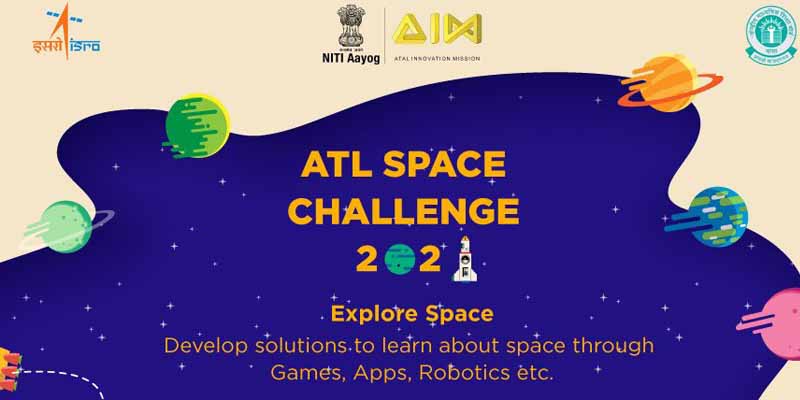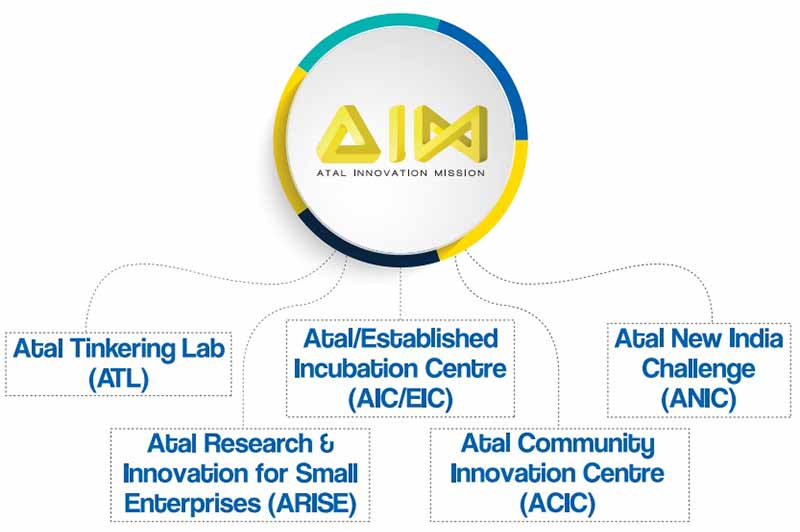- India
- Sep 11
Atal Innovation Mission launches Space Challenge
NITI Aayog’s Atal Innovation Mission (AIM), in collaboration with the Indian Space Research Organisation (ISRO) and Central Board of Secondary Education (CBSE), has launched the ATL Space Challenge 2021 for school students across India.
Highlights of Space Challenge:
• This challenge has been designed for all the school students, mentors and teachers across the country who not only are associated with schools having Atal Tinkering Labs (ATL) labs but for all the non-ATL schools as well.
• This is to ensure that students of Classes 6 to 12 are given an open platform where they can innovate and enable themselves to solve digital age space technology problems.
• The ATL Space Challenge 2021 aligns with the World Space Week 2021 which is being observed from October 4-10 each year at the global level in order to celebrate the contributions of space science and technology.
• The aim of this challenge is to enable innovation among young school students to create something in the space sector that will not only help them learn about the space but create something that the space programme can use itself.
• Students (from ATL and Non-ATL schools) can submit their entries, be it a solution or an innovation, in a team of up to three members. Teams must be aligned to one of the Challenge Themes under which the problems can be identified.
Students can create a solution that can be implemented and adopted leveraging technologies such as:
1) Explore Space
2) Reach Space
3) Inhabit Space
4) Leverage Space
• Each team, based on their interest and understanding, must select one problem which falls under any one of the Space Challenge themes.
Atal Innovation Mission
• AIM is a flagship initiative set up by NITI Aayog to promote innovation and entrepreneurship across the country.
• AIM is also envisaged as an umbrella innovation organisation that would play an instrumental role in alignment of innovation policies between central, state and sectoral innovation schemes.
• It promotes an ecosystem of innovation and entrepreneurship at various levels — higher secondary schools, science, engineering and higher academic institutions, and SME/MSME industry, corporate and NGO levels.
Major initiatives undertaken by AIM are:
• Establishment of Atal Tinkering Laboratories (ATLs) in schools to create a problem-solving mindset in students between Classes 6–12.
• Establishment of Atal Incubation Centres (AICs) in universities, institutions, and the private sector to foster world-class startups, as well as adding new dimensions of outcome-based scale-up and monitoring of existing incubator models.
• Launch of Atal New India Challenges (ANICs) to foster product and service innovations in the country with national socio-economic impact and aligning them to the sectoral needs of various ministries/industry and with the Sustainable Development Goals (SDGs).
• Establishment of Atal Community Innovation Centres (ACICs) in the unserved/underserved regions of the country, including tier-2 and tier-3 cities and in the hinterland, to stimulate community-centric innovations and create local hubs of innovation and job creation.
• Launch of Applied Research and Innovation Challenges for Small Enterprises (ARISE) to stimulate Make in India research and innovations in the MSME industry.
• Establish a nationwide voluntary Mentors of Change network to support all the initiatives of AIM.
• Building strategic innovation partnerships with the public and private sectors and multinationals, and country-to-country partnerships to promote collaborations and cross-border innovation exchanges.
Atal Tinkering Lab (ATL) programme
• Atal Tinkering Lab (ATL) programme is a state-of-the-art space established in a school with a goal to foster curiosity and innovation in young minds, between Classes 6-12 across the country through 21st century tools and technologies such as Internet of Things, 3D printing, rapid prototyping tools, robotics, miniaturized electronics, do-it-yourself kits and many more.
• ATL is a workspace where young minds can give shape to their ideas through hands-on do-it-yourself mode and learn innovation skills.
• The aim is to stimulate a problem-solving innovative mindset within the children of the ATL and nearby communities.
• The AIM has selected 10,000 schools in over 680 districts of the country for the establishment of ATLs. More than 7,000 schools are funded till now and over 2 million students have access to ATLs.
Objectives of ATL:
• To create workspaces where young minds can learn innovation skills, sculpt ideas through hands-on activities, work and learn in a flexible environment.
• To empower our youth with the 21 century skills of creativity, innovation, critical thinking, design thinking, social and cross-cultural collaboration, ethical leadership and so on.
• To help build innovative solutions for India’s unique problems and thereby support India’s efforts to grow as a knowledge economy.
Manorama Yearbook app is now available on Google Play Store and iOS App Store


